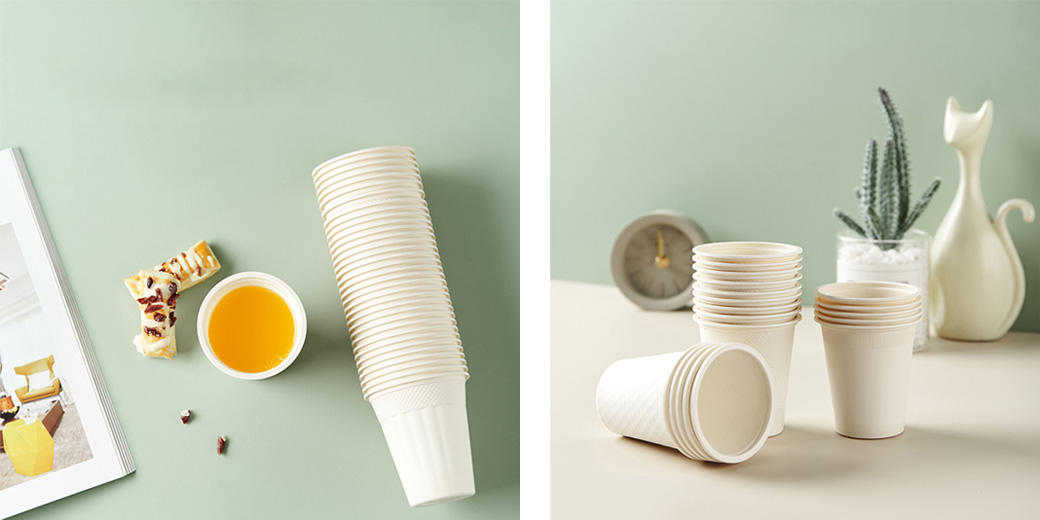In an age where environmental sustainability is more important than ever, industries and consumers alike are seeking eco-friendly alternatives to traditional plastic products. One such innovation gaining traction is cornstarch cups-a biodegradable, plant-based alternative to single-use plastic cups. Made from renewable resources and designed to break down naturally, cornstarch cups are a small yet impactful step towards reducing plastic waste and promoting sustainability.

What Are Cornstarch Cups?
Cornstarch cups are made from polylactic acid (PLA), a type of bioplastic derived from fermented corn starch. This natural material is abundant, renewable, and biodegradable, making it an excellent choice for products that would otherwise contribute to pollution.
The process of creating PLA involves extracting starch from corn, which is then fermented to produce lactic acid. This lactic acid is polymerized into polylactic acid, which can be molded into a variety of forms, including cups, utensils, and packaging materials.
Benefits of Cornstarch Cups
1. Environmentally Friendly
One of the biggest advantages of cornstarch cups is their biodegradability. Unlike traditional plastic, which can take hundreds of years to decompose, cornstarch cups break down naturally in a matter of months under the right composting conditions. This helps to reduce the amount of plastic waste that ends up in landfills or oceans, significantly lessening the environmental impact.
2. Renewable Resource
Cornstarch cups are made from corn, a readily available and renewable resource. Since corn can be replanted annually, the production of cornstarch cups doesn’t deplete non-renewable resources like petroleum, which is used to make conventional plastics.
3. Reduced Carbon Footprint
The production of PLA from corn starch generates fewer greenhouse gases than the production of traditional plastics. By choosing cornstarch cups, businesses and consumers can reduce their carbon footprint and contribute to a more sustainable future.
4. Non-Toxic and Safe
Cornstarch cups are free from harmful chemicals like BPA (Bisphenol A) and phthalates, which are commonly found in traditional plastic products. This makes them a safer option for both the environment and human health, especially when used for food and beverages.
5. Versatile and Durable
Despite being biodegradable, cornstarch cups are surprisingly durable and versatile. They can handle both hot and cold beverages, making them a practical option for cafes, restaurants, and events. With designs that are just as functional and aesthetically pleasing as plastic cups, they’re an easy switch for businesses looking to go green.
Challenges of Cornstarch Cups
While cornstarch cups offer numerous benefits, they also come with some challenges that need to be addressed.
1. Composting Infrastructure
Cornstarch cups require industrial composting facilities to break down efficiently. In a home composting environment or in landfills, they may take longer to decompose. Unfortunately, not all regions have access to the necessary infrastructure for industrial composting, which can limit the effectiveness of cornstarch cups in reducing waste.
2. Corn as a Resource
While corn is a renewable resource, the large-scale production of corn for bioplastics can contribute to issues like deforestation, soil degradation, and water use. To make the production of cornstarch cups truly sustainable, it's important to ensure that the corn is sourced responsibly, with minimal environmental impact.
The Future of Cornstarch Cups
As awareness of the environmental impact of plastic waste grows, the demand for eco-friendly alternatives like cornstarch cups is likely to increase. Many businesses, especially in the food and beverage industry, are already making the switch to biodegradable products to meet consumer demand for sustainability.
Innovation in bioplastics is also progressing rapidly. Researchers are continually working on improving the efficiency of cornstarch production and the compostability of PLA products. With advances in technology and increased investment in composting infrastructure, cornstarch cups could become a mainstream alternative to plastic cups in the near future.
Conclusion
Cornstarch cups represent a promising solution to the growing problem of plastic waste. By using a renewable, biodegradable material, they offer a way to reduce our reliance on petroleum-based plastics and minimize environmental harm. While challenges remain, the shift toward cornstarch cups and other eco-friendly alternatives is a step in the right direction for a more sustainable future.
Whether you're a business owner looking to reduce your environmental footprint or a consumer trying to make greener choices, opting for cornstarch cups is a small change that can make a big difference. Let’s embrace this innovation and continue working towards a cleaner, greener planet.